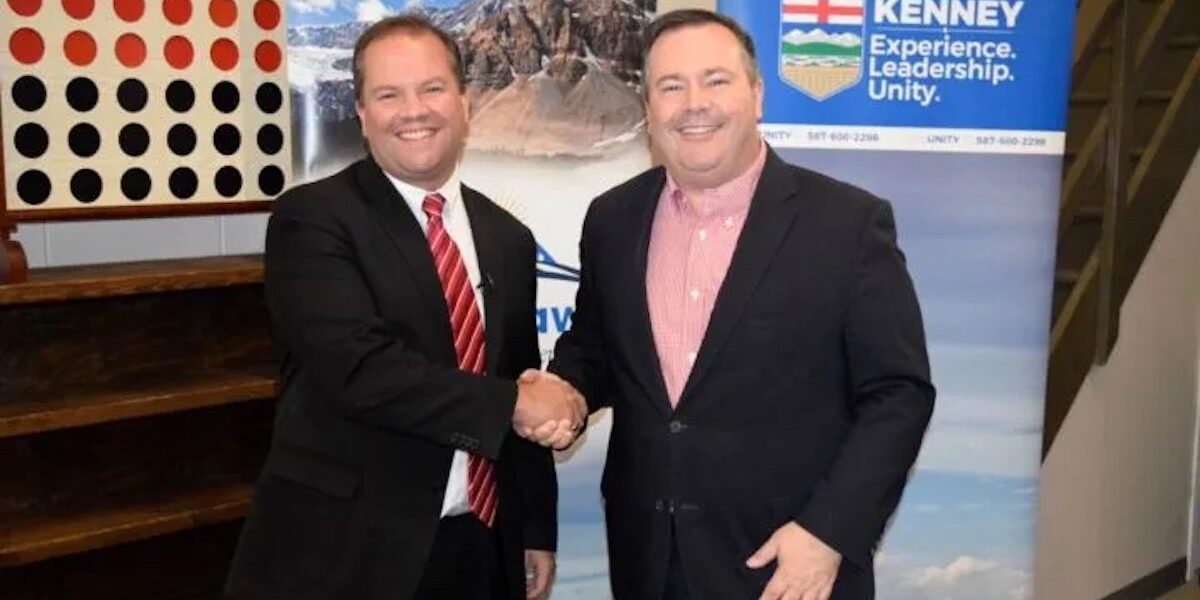After five years, Canada’s national police force has concluded no charges will be laid in the notorious Kamikaze Affair, as allegations of fraud and identity theft in Jason Kenney’s victorious 2017 campaign to lead the newly formed Alberta United Conservative Party (UCP) came to be known.
The affair came by its colourful name because of an allegation that candidate Jeff Callaway was in the race on Kenney’s behalf solely to deliver a “Kamikaze” attack against Kenney’s chief rival for the leadership, former Wildrose Party leader Brian Jean.
So the quick summary of what was announced by RCMP Superintendent Rick Jané is basically that the Mounties’ “extremely complex” investigations concluded that while there were “suspected instances of potential identity fraud,” as the force’s lengthy and defensive news release cautiously put it, “the number of potential votes at issue, which after investigation was less than 200, would not have impacted the leadership contest.”
Anyway, the release continued, “there was no evidence that any leadership candidate orchestrated these relatively rare instances.”
Ergo, “there was insufficient evidence to charge any suspect.”
But as soon as the RCMP sent out a peculiar notice to media inviting reporters to a confidential “technical brief and media availability in relation to a high-profile investigation,” it was obvious to almost everyone who follows Alberta politics that the glacial Kamikaze investigation was finally going to grind to a halt.
And after reading the next part of the notice, it was equally clear that the investigation wasn’t about to end with a bang, but a whimper.
“Important,” exclaimed the notice, surrounded with exquisite passive-aggressiveness by double asterisks, “due to the sensitive nature of the of the information being discussed, and with an understanding the RCMP would like this information to be released to the public in a fair and concurrent manner, reporters wishing to attend the Technical Brief will be requested to RSVP their attendance in advance and leave all recording devices (cameras, digital audio recorders, cell phones) in their vehicles or in our secured lobby under guard by our Commissionaires.” (Emphasis added.)
To say this is highly unusual would require time-consuming and intensive research – although not as time consuming and intensive as the RCMP’s marathon investigation, obviously, which the force said involved 65 investigators who conducted 563 interviews, took 12 out-of-province trips, and spent $460,877 in overtime and travel expenses above salaries and other fixed costs.
But to say it is not best public relations practice is obvious, unless the RCMP’s intention was to create the suspicion what it was about to announce was not quite the whole story, or its spokesperson needed a practice run with a high level of deniability to see what kind of questions the reporters would ask.
At any rate, after the in camera practice run was completed, participants could move out to the lobby where their cameras and camera-people were waiting.
Then we ordinary Albertans could all be reassured, via the RCMP’s fulsome statement, “that these allegations of possible voter fraud occurred during an internal political party voting process, and in no way represents any possible fraud or shortcomings in our general provincial and federal elections.”
Plus, while it is true that Callaway did drop out of the race and endorse Kenney, the RCMP concluded there’s no way to prove that he and the former federal cabinet minister colluded to sink Jean’s campaign in a way that violated section 380 of the Criminal Code, that is to say, by fraud.
As for the allegations of identity theft, the Mounties noted, they were investigated as potential violations of section 403 of the Criminal Code, identity fraud. Evidence was insufficient there too to proceed to charges.
Press Progress reported that Superintendent Jané did concede that in many cases of suspicious votes, police had evidence from individuals whose names appeared on the UCP voter list that they had “no knowledge” of voting “or did not permit anyone to vote on their behalf.” But lacking witnesses to what might have happened when the actual voting took place, “we didn’t have that evidence at the end of the day.”
So – after five seemingly interminable years – it would appear that without the formality of an actual trial, the RCMP have reached what used to be known as a “Scotch verdict” – not proven.
Nevertheless, Kenney quickly declared on social media that the result of the long RCMP investigation, “confirms categorically what I have said all along: there was no wrongdoing on the part of me or of my 2017 UCP leadership campaign.”
Kenney’s tweet linked to a longer statement that called the original allegations “obviously ridiculous bad faith complaints that led to a string of defamatory accusations,” and concluded, “today’s outcome is a total vindication of my 2017 leadership campaign.”
Kenney won the leadership vote decisively, with 36,625 votes or 61 per cent of the ballots cast, compared to 18,336 or 31 per cent for Jean and 4,273 or seven per cent for Doug Schweitzer.
One supposes it will never be known if the lingering miasma from the Kamikaze Affair had any influence at all on the 2022 leadership review vote by UCP members, many unhappy with his response to the COVID-19 pandemic, whose 51.4 per-cent approval vote effectively ended his tenure as Alberta premier and sent him packing.



